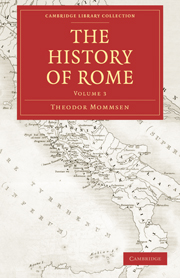Book contents
- Frontmatter
- PREFATORY NOTE
- Contents
- BOOK FOURTH: THE REVOLUTION
- CHAPTER I THE SUBJECT COUNTRIES DOWN TO THE TIMES OF THE GRACCHI
- CHAPTER II THE REFORM MOVEMENT AND TIBERIUS GRACCHUS
- CHAPTER III THE REVOLUTION AND GAIUS GRACCHUS
- CHAPTER IV THE RULE OF THE RESTORATION
- CHAPTER V THE PEOPLES OF THE NORTH
- CHAPTER VI THE ATTEMPT OF MARIUS AT REVOLUTION AND THE ATTEMPT OF DRUSUS AT REFORM
- CHAPTER VII THE REVOLT OF THE ITALIANS AND THE SULPICIAN REVOLUTION
- CHAPTER VIII THE EAST AND KING MITHRADATES
- CHAPTER IX CINNA AND SULLA
- CHAPTER X THE SULLAN CONSTITUTION
- CHAPTER XI THE COMMONWEALTH AND ITS ECONOMY
- CHAPTER XII NATIONALITY, RELIGION, AND EDUCATION
- CHAPTER XIII LITERATURE AND ART
- CORRECTIONS
CHAPTER XI - THE COMMONWEALTH AND ITS ECONOMY
Published online by Cambridge University Press: 05 October 2010
- Frontmatter
- PREFATORY NOTE
- Contents
- BOOK FOURTH: THE REVOLUTION
- CHAPTER I THE SUBJECT COUNTRIES DOWN TO THE TIMES OF THE GRACCHI
- CHAPTER II THE REFORM MOVEMENT AND TIBERIUS GRACCHUS
- CHAPTER III THE REVOLUTION AND GAIUS GRACCHUS
- CHAPTER IV THE RULE OF THE RESTORATION
- CHAPTER V THE PEOPLES OF THE NORTH
- CHAPTER VI THE ATTEMPT OF MARIUS AT REVOLUTION AND THE ATTEMPT OF DRUSUS AT REFORM
- CHAPTER VII THE REVOLT OF THE ITALIANS AND THE SULPICIAN REVOLUTION
- CHAPTER VIII THE EAST AND KING MITHRADATES
- CHAPTER IX CINNA AND SULLA
- CHAPTER X THE SULLAN CONSTITUTION
- CHAPTER XI THE COMMONWEALTH AND ITS ECONOMY
- CHAPTER XII NATIONALITY, RELIGION, AND EDUCATION
- CHAPTER XIII LITERATURE AND ART
- CORRECTIONS
Summary
External and internal bankruptcy of the Roman state
We have traversed a period of ninety years—forty years of internal profound peace, fifty of an almost constant revolution. It is the most inglorious epoch known in Roman history. It is true that the Alps were crossed both in an easterly and westerly direction (P. 168, 177), and the Roman arms reached in the Spanish peninsula as far as the Atlantic Ocean (P. 18) and in the Macedono-Grecian peninsula as far as the Danube (P. 177); but the laurels thus gained were as cheap as they were barren. The circle of the “extraneous peoples under the will, sway, dominion, or friendship of the Roman burgesses,” was not materially extended; men were content to realize the gains of a better age and to bring the communities attached to Rome in laxer forms of dependence more and more into full subjection. Behind the brilliant screen of provincial reunions was concealed a very sensible decline of Roman power. While the whole ancient civilization was daily more and more distinctly embraced in the Roman state and received in it a more general recognition, the nations excluded from it began simultaneously beyond the Alps and beyond the Euphrates to pass from defence to aggression. On the battle-fields of Aquae Sextise and Vercellae, of Chseronea and Orchomenus, were heard the first peals of that thunder-storm, which the Germanic tribes and the Asiatic hordes were destined to bring upon the Italo-Grecian world, and the last dull rolling of which has reached almost to our own times. But in internal development also this epoch bears the same character. The old organization collapses irretrievably.
- Type
- Chapter
- Information
- The History of Rome , pp. 392 - 420Publisher: Cambridge University PressPrint publication year: 2010First published in: 1863

